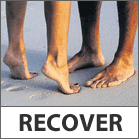
Brian Cowen has been Taoiseach for 10 months. For most of that time his government has been following rather than setting the news agenda. A large part of the responsibility for this situation rests with the government. But Cowen's coalition has been governing in extraordinarily difficult times having experienced in less that a single year rejection of the Lisbon treaty referendum, an economic collapse and a banking crisis. Against this backdrop it should be expected that anything that gets the public talking about other news would be welcomed by the government. Not so, it would seem, if the government press secretary can make time to become embroiled in a row over a story of little consequence.
Personal taste will determine whether one finds the nude portraits of Cowen funny or offensive. Martin Turner uses heavy caricature and exaggeration in his Irish Times portrayals of leading public figures. Nobody seems concerned about Turner's representation of the Taoiseach as a smoker. Yet a very different response met Conor Casby's focus on Cowen's weight – and the fact that he was in the nude. Such sensitivities would suggest that nicotine addiction is acceptable but obesity and nudity make us uncomfortable. Yet, it is worth recalling that satire works by exaggerating one aspect of a prominent person's personality or physical appearance. When Spitting Image burst onto British television screens in 1984, viewers were confronted with puppets of Margaret Thatcher and Ronald Reagan locked in a whopper of a kiss. "She's a fine looking woman. It's a pity I'm only screwing her country," the Reagan puppet remarked.
Over the following years Thatcher was presented as a bully, a dictator and even a crossdresser who used the gents' bathroom. No doubt some of Thatcher's colleagues and her family members found these characterisations offensive. RTé's Scrap Saturday achieved something similar. The 'PJ Mara' on radio was a million miles from the real man. And for all his faults, Padraig Flynn was not the caveman of the Flintstones sketch.
But in each case the exaggeration worked because, in how they lampooned their targets, the creators of Spitting Image and Scrap Saturday were funny. But more importantly they were often biting and subversive. Such humour takes prisoners of those in public life – being in the public eye means being the butt of attempts at public humour. The best way for those in public life to respond is not to respond at all. The same applies to their family members and press officers. Ignore and move on.
On their own, the Casby paintings are hardly in the satire league of an average Scrap Saturday sketch or an off-day Turner cartoon. There are significantly funnier and more subversive photo-shopped images on the internet. The fact that the artist succeeded in mounting the paintings onto the walls of two public galleries is why the story was newsworthy. But newsworthy for the main evening news on the national broadcaster? Probably not, in my own opinion. But even that conclusion does not justify the subsequent RTé apology. The station should have stood over its initial editorial decision to include the report on the Nine O'Clock News bulletin as a light 'kicker' item. In all this it is hard to see how the report involved any disrespect for the office of the Taoiseach, as the RTé apology suggested. Satire survives on disrespect. But RTé was not satirising – it was merely reporting the satire.
In the whole episode the most significant intervention was the government complaint to RTé – which turned a non-story about two fairly average paintings into news. Indeed, this very piece would probably not have been written if the government press secretary had not complained to RTé about the report.
Interestingly, RTé and Cowen have had a tetchy few months. But there was not a fraction of the current comment when the broadcaster and the Taoiseach last squared up after an incorrect RTé news report about remarks made by Cowen led to a short-term run on the euro. The euro report was a serious error. The nude painting report was not. Nobody is dead. Nobody has lost their job. Some people – a minority I would hazard – took offence. Other people laughed and moved on. Sometimes the best advice is to leave well enough alone. If the government response had been silence, the story would have slipped away.
So when the Oireachtas Communications committee meets RTé management next month it would do well to concentrate on real issues. The deteriorating financial situation at the national broadcaster, its relationship with its top-earning presenters and how the new digital world threatens audiences and advertising are real issues. Politicians and their advisers should stick to real issues. It's the job of satirists to lampoon even if their work causes offence to some people.
Kevin Rafter is head of the Department of Film and Media at the National Film School at IADT, Dun Laoghaire



 del.icio.us
del.icio.us digg
digg Facebook
Facebook







